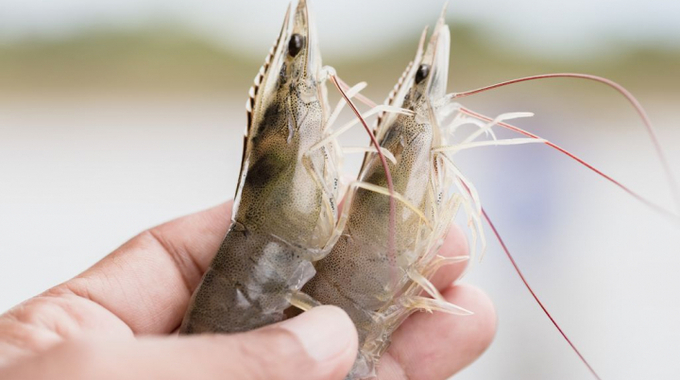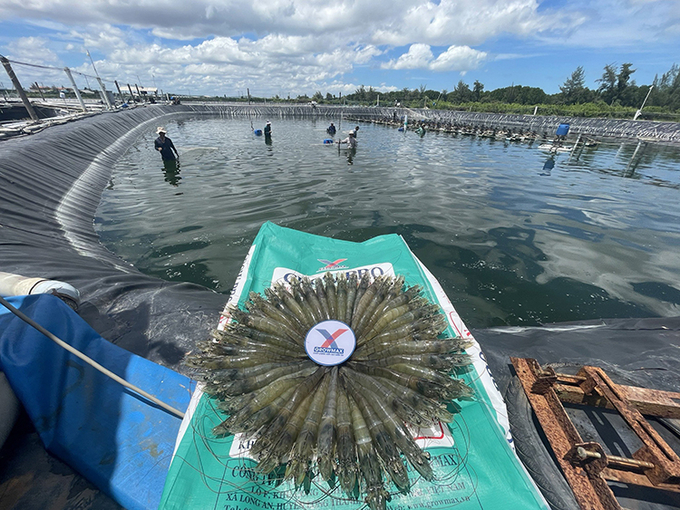November 24, 2025 | 22:56 GMT +7
November 24, 2025 | 22:56 GMT +7
Hotline: 0913.378.918
November 24, 2025 | 22:56 GMT +7
Hotline: 0913.378.918

The Vietnamese government does not prohibit the use of ethoxyquin in aqua feed. Photo: DT.
Mr. Hoang Sy Nam, an expert from the Department of Aquaculture Feed and Seed Management under the Directorate of Fisheries confirmed that it is normal for shrimp feed to contain ethoxyquin.
Aquaculture feed is rapidly oxidized during processing and preservation due to its high fat content which includes unsaturated fatty acids. Oxidized feed will have a rancid smell and lose its essential fatty acids, fat-soluble vitamins such as A, D, E, and carotenoids are destroyed, reducing the overall nutritional value of food.
As a result, antioxidants is a required ingredient in aquaculture feed. The added antioxidants must be cheap, easily digestible, and non-toxic to animals and consumers.
Ethoxyquin was first discovered in the 1950s as a way to preserve the quality of animal feed. This chemical compound was employed as a lipid antioxidant, which is a preservative in animal feed that protect lipids as well as boost the stability of fat-soluble vitamins and carotene.
Export markets around the world have different regulations regarding the amount of ethoxyquin allowed in shrimp feed.
Mr. Hoang Sy Nam added: "Companies producing aquaculture feed, especially shrimp feed, are only required by the Directorate of Fisheries to disclose the amount of ethoxyquin used in their products on the packaging".
This transparency will assist shrimp farmers in making appropriate purchases because each farm has a different target market for export. The Vietnamese government does not prohibit the use of ethoxyquin in the production of animal and aquaculture feed. However, the permitted threshold for this substance in aquaculture feed is 150 ppm.

GrowMax has developed a system of quality shrimp feed products that significantly boost the growth of farmed shrimp. Photo: DT.
With the recent drop in shrimp prices due to reduced demand in import markets, many people have started spreading rumors that if farmers used ethoxyquin-added shrimp feed, they would not be able to sell their shrimp or could only sell them for less than VND 4,000 - 5,000 per kilogram.
A representative from GrowMax Aquaculture Feed Co., Ltd. claims that this is a sneaky tactic employed by rivals to harm this company and several other aquaculture feed producers who utilize ethoxyquin.
According to Circular No. 04/2020/TT-BNNPTNT dated March 9, 2020 by the Ministry of Agriculture and Rural Development, the permitted ethoxyquin threshold for aquaculture feed is 150 ppm. The representative affirmed that the ethoxyquin content in GrowMax products are constantly maintained at 30 ppm, which is only 20% of the ceiling,
“GrowMax has not only affirmed the quality of its shrimp feed products, but it has also accompanied shrimp farmers and reduced prices for feed during the devastating Covid-19 pandemic. GrowMax's market share has been growing since then, and competitors have started spreading rumors to damage our brand as a result," commented the Director of GrowMax.
The representative explained that GrowMax's shrimp feed utilizes ethoxyquin because it uses fishmeal from Peru and Chile. These countries produce high-quality fishmeal but because they are far from Vietnam, preservatives must be added.
On the other hand, although fishmeal from Vietnam, China or Thailand does not require the use of ethoxyquin, its quality is noticeable lower.
In addition to affecting GrowMax's reputation and revenue, these rumors provide traders with an excuse to drive prices when purchasing shrimp from farmers. GrowMax believes that this behavior will have a negative impact on the entire shrimp industry in Vietnam
Consequently, GrowMax has requested competent authorities to intervene, verify the rumors and take necessary measures to protect the aquaculture feed business community. In addition, the company suggested local Departments of Agriculture and Rural Development to mobilize agricultural inspection forces to verify and handle unfair competition cases.
GrowMax Aquaculture Feed Co., Ltd., located in Loc An Industrial Park, Long Thanh District, Dong Nai Province, is a domestic business in the field of high-tech shrimp feed production with an annual capacity of 220,000 tons. GrowMax has risen to become one of the three shrimp feed companies with the largest output and market share in Vietnam today.
GrowMax was awarded the Certificate of Best Aquaculture Practices (BAP) by the Global Trust Aquaculture Alliance (GAA). The BAP certificate is considered to be a prestigious "stamp" for products consumed in the most demanding markets around the world such as Japan, the US and Europe.
Translated by Nguyen Hai Long

(VAN) Green transition is crucial for the Mekong Delta amid climate change and stricter standards, offering a path toward sustainability.

(VAN) Dong Thap promotes agricultural restructuring, forms large specialized farming zones, raises the value of agricultural products and develops toward ecological and high-tech directions.
/2025/11/22/4018-4-213342_747.jpg)
(VAN) The Mekong Delta Agricultural Experts Club has attracted 143 experts and researchers to participate in providing consultancy and contributing initiatives to the development of one million hectares of high-quality rice.

(VAN) Ca Mau’s development of OCOP products opens a path to increasing cooperatives value, helping boost income, expand markets, and affirm collective economy's role.

(VAN) Turning seemingly ordinary coconut shells into unique jewelry and artwork, Nguyen Bang Nhi spreads the value of local culture through her brand, Cocohand.

(VAN) Results from the Sustainable Durian Model Project in Dak Lak have confirmed the critical role of Yara Viet Nam in transferring advanced nutritional solutions to farmers.

(VAN) In Tuyen Quang province, livestock farmers have introduced effective models and innovative practices that significantly strengthen African Swine Fever prevention and control efforts.